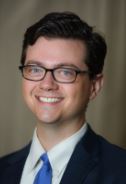
The Carroll Forum for Citizenship and Public Life is an upcoming program in the School of Arts and Sciences at The Catholic University of America that looks at the often rancorous political discourse happening in the United States and wants to change it.
Justin B. Litke, assistant professor of politics and a fellow of the Center for the Study of Statesmanship, is leading the program as it takes shape.
He answered some questions about the exciting Carroll Forum and its potential. Funding for the program is still being secured. If you’d like to give to the Forum’s formation, visit here.
As a baseline, what is the intent of the Carroll Forum and how will it address a need in society?
The Carroll Forum is aimed at helping to cultivate the skills, virtues, and convictions needed for a republic to flourish. Politics is dysfunctional today. Too many citizens enter the public arena unprepared to speak persuasively, participate in debates with magnanimity and goodwill, and to understand where others might get their very different opinions and convictions. It makes for a worse republic and makes a functional politics almost impossible. We can do something about this by training students in the same way that formerly produced men and women of conviction and goodwill: by reading classic works of philosophy and literature, learning the skills to speak persuasively and think creatively, and to cultivate sufficient virtue so that they may pursue the common good in concert with their fellow citizens in the spirit of public service.
What are some key goals?
We want our students to be leaders and saints. We want them to be men and women of good character, joy, and erudition. We want them to pursue a life of virtue and service without sacrificing themselves to either the popular whims of a moment or to the supposed impossibility of pre-formulated options before them. Our fellows will think creatively and energetically about the moral, philosophical, institutional, and political problems faced by our citizenry.
How did it come about?
A few faculty have become increasingly concerned that the intellectual life of our students outside the classroom is non-existent. I began to think of concrete steps that could create a critical mass of students on campus in order to "seed" a healthier, robust, joyful intellectual culture on campus. Dean Tom Smith heard that I was developing this idea and encouraged me to continue. We are currently seeking donors large and small to help begin and advance our work.
What will it look like in practice, in the classroom, and beyond?
For now, we'll focus on cultivating a robust community amongst ourselves. Students today, even great ones, report that they want more structure around activities and to be taught how to live an intellectual life. They aren't necessarily aware, or aware enough, that the intellectual life can be and ought to be a calling to each of our students, whether he or she pursues graduate study or not. So we will have dinners and reading groups, host discussions and lectures, and eventually we will have a community robust enough to conduct some Oxford Union-style debates, partnering with others on and off campus and helping CUA to play a central role in defining what it means to engage thoroughly with the issues of the day without being bogged down by, in the worse sense of the words, the "politics of the moment".
How can potential and current students engage with the forum?
We are currently interested in talking with students who want to be a part of the Forum and I encourage them to contact me at Litke@cua.edu.
